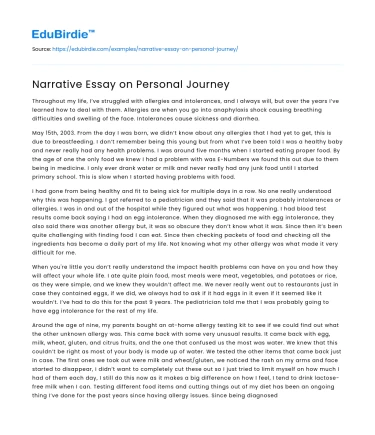Introduction
The journey of personal transformation is a universal narrative that resonates deeply within the human experience. It is a tale of growth, self-discovery, and change that transcends cultural and social boundaries. This essay delves into the intricacies of an individual's personal journey, examining the catalysts for change, the challenges faced along the way, and the profound impact of self-reflection. Through an academic lens, we will explore how personal narratives are not merely stories but pivotal frameworks that shape one's identity and worldview. The essence of a personal journey lies not only in the destination but in the transformative experiences encountered along the path. As noted by psychologist Carl Rogers, "The only person who is educated is the one who has learned how to learn and change."
Catalysts for Change
Personal transformation often begins with a catalyst—an event or realization that prompts an individual to embark on a journey of change. These catalysts can range from life-altering events such as the loss of a loved one, a significant career change, or even a chance encounter that challenges one's preconceived notions. According to Maslow's hierarchy of needs, individuals are driven to achieve self-actualization once their basic needs are met, suggesting that existential crises often serve as triggers for personal development (Maslow, 1943). For instance, the story of Malala Yousafzai exemplifies how a traumatic experience can ignite a profound personal and societal transformation. After surviving an assassination attempt, Malala's resolve to advocate for girls' education strengthened, transforming her into a global symbol of resilience and empowerment.
Save your time!
We can take care of your essay
- Proper editing and formatting
- Free revision, title page, and bibliography
- Flexible prices and money-back guarantee
The psychological underpinnings of these catalysts are rooted in cognitive dissonance theory, which posits that individuals experience discomfort when holding conflicting beliefs or attitudes (Festinger, 1957). This discomfort acts as a motivator for change, as individuals strive to achieve cognitive harmony. In the context of personal transformation, catalysts disrupt this harmony, forcing individuals to reevaluate their perspectives and behaviors. However, it is important to acknowledge that not all catalysts lead to positive change. Some individuals may resist transformation due to fear of the unknown or the comfort of familiarity. This resistance highlights the complexity of personal journeys, where the interplay of motivation, resilience, and external influences determines the trajectory of change.
Challenges and Resilience
As individuals navigate their personal journeys, they invariably encounter challenges that test their resilience and determination. These obstacles, while daunting, are integral to the process of transformation as they foster growth and self-awareness. The concept of resilience, defined as the ability to adapt in the face of adversity, plays a crucial role in overcoming these challenges (Masten, 2001). Research indicates that resilience is not an inherent trait but a skill that can be developed through experience and reflection. For example, the narratives of individuals who have overcome addiction often highlight the importance of resilience in maintaining sobriety and achieving personal growth.
However, the path to resilience is fraught with setbacks and failures, which can either serve as stepping stones or stumbling blocks. The theory of post-traumatic growth suggests that individuals can achieve significant personal development following traumatic experiences, provided they have the necessary support and coping mechanisms (Tedeschi & Calhoun, 1996). This theory underscores the importance of social support systems and positive coping strategies in navigating personal challenges. Conversely, the lack of such support can exacerbate feelings of helplessness and hinder the process of transformation. Thus, the role of community, therapy, and self-care is paramount in cultivating resilience and facilitating personal growth.
The Impact of Self-Reflection
Self-reflection is a cornerstone of personal transformation, serving as a tool for introspection and self-awareness. It allows individuals to assess their values, beliefs, and goals, leading to a deeper understanding of their identity and purpose. The practice of self-reflection is supported by mindfulness techniques, which have been shown to enhance emotional regulation and cognitive flexibility (Kabat-Zinn, 2003). By fostering a non-judgmental awareness of one's thoughts and emotions, mindfulness enables individuals to identify patterns of behavior that may hinder their growth.
Furthermore, self-reflection facilitates the process of meaning-making, an essential component of personal transformation. Viktor Frankl's logotherapy posits that the search for meaning is a fundamental human drive, and that individuals derive purpose through their experiences and choices (Frankl, 1959). This perspective aligns with the narrative identity theory, which suggests that individuals construct their identities through the stories they tell about their lives. By engaging in self-reflection, individuals can reframe their narratives, transforming past adversities into sources of strength and wisdom. However, the process of self-reflection is not without challenges, as it requires confronting uncomfortable truths and embracing vulnerability. Despite these difficulties, the rewards of self-reflection are manifold, leading to a more authentic and fulfilling life.
Conclusion
In conclusion, the journey of personal transformation is a complex and multifaceted process that encompasses catalysts for change, challenges, resilience, and self-reflection. It is a narrative that unfolds uniquely for each individual, shaped by internal and external factors. While the path to transformation is fraught with obstacles, it is through these challenges that individuals discover their true potential and achieve personal growth. As Ralph Waldo Emerson aptly stated, "What lies behind us and what lies before us are tiny matters compared to what lies within us." By embracing the journey of personal transformation, individuals can transcend their limitations and create a life of purpose and meaning. Ultimately, the narrative of personal transformation serves as a testament to the enduring capacity for change and the indomitable spirit of the human condition.






 Stuck on your essay?
Stuck on your essay?

